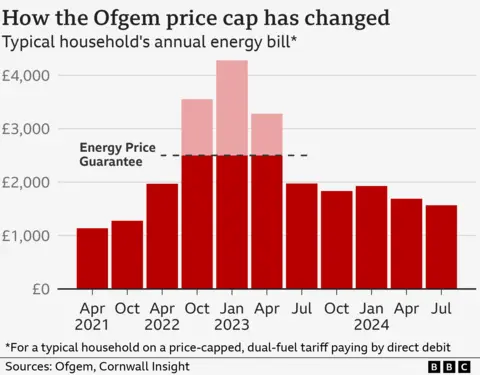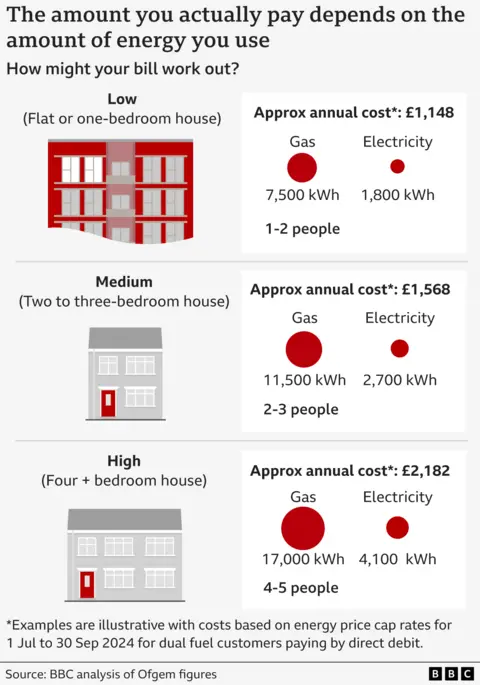Kevin Peachey,Cost of living correspondent
 BBC
BBCA typical household’s energy bill will fall by £122 a year from July under the new price cap.
The latest quarterly cap for England, Wales and Scotland means a household using a typical amount of gas and electricity will pay £1,568 a year.
It means that bills will be the lowest for two years.
The cap, set by the regulator Ofgem, limits the maximum price that can be charged for each unit of gas and electricity – not the total bill.
If you use more energy, you will pay more.
It affects the gas and electricity bills of 28 million households, but does not impact customers in Northern Ireland, where the sector is regulated differently but where prices are also falling.

Energy prices are at their lowest level since Russia invaded Ukraine in February 2022.
However, bills remain well above pre-pandemic levels and are about £400 higher than three years ago.
An estimated £3bn debt to suppliers has been built up by consumers when prices were high.
“The fall in the energy price cap reduces bills slightly,” said Dame Clare Moriarty, chief executive of Citizens Advice. “But our data tells us millions have fallen into the red or are unable to cover their essential costs every month.”
Analysts at the consultancy Cornwall Insight have forecast that recent rising wholesale prices may mean energy bills rise again in the run-up to winter.

Debra Baxter has high energy use throughout the year, having to charge her wheelchair to get out and move around her home.
“The lower [prices] are still not enough to pay for my wheelchair to be charged every day,” she said.
“I’ve had to put my energy bill on my credit card and hopefully pay for it the following month when I have a bit more money.”
With gas and electricity prices affecting so many lives, and touching so many parts of our economy, energy will be a key election battleground.
As well as the prices people pay, there is a debate over energy security and the move towards net zero.
Energy Security and Net Zero Secretary, Claire Coutinho, said the system would be tightened up under the Conservatives to ensure greater competition to benefit consumers.
Labour argued there was little substance to the plan, with leader Sir Keir Starmer saying the party would create a publicly-owned power company to invest in wind and solar projects.
Direct debit payments
Those on prepayment meters, who tend to top up meters during the colder, darker months, will see a less immediate impact of a drop in prices in the summer.

The vast majority of households pay by direct debit, and their payments are smoothed out over the year. They can expect more information from their supplier in the coming days about any price changes.
Companies will judge the level of direct debit on previous, and future predicted, usage. Customers can challenge any, or no, change by talking initially to their energy provider.
Falling energy bills have already helped push inflation down to its lowest level in almost three years. Further declines would continue to feed through to the inflation rate, and may create more impetus for the Bank of England to reduce interest rates.
Ofgem is also gathering views on the way the price cap is calculated, including whether there should be a change to standing charges.
These are the fixed daily charges covering the costs of connecting to a supply, which have risen sharply in some areas.
How energy prices will change from July
- Gas prices will be capped at 5.48p per kilowatt hour (kWh), and electricity at 22.36p per kWhA typical household uses 2,700 kWh of electricity a year, and 11,500 kWh of gas
- Households on pre-payment meters will pay slightly less than those on direct debit, with a typical bill of £1,522
- Those who pay their bills every three months by cash or cheque will pay more, with a typical bill of £1,668
- Standing charges – a fixed daily charge covering the costs of connecting to a supply – are unchanged at 60p a day for electricity and 31p a day for gas, although they vary by region

How to keep energy use – and bills – down
Experts have shared three tips to keep on top of energy use during the warmer months:
- If your hot water is too hot to wash your hands in, then your setting is too high so turn the boiler down
- Manage your draughts, such as putting a black bag with scrunched up paper up an unused chimney, or limit other draughts around the home
- Limit time in the shower to four minutes. The charity WaterAid has compiled a playlist of four-minute songs to keep you to time


